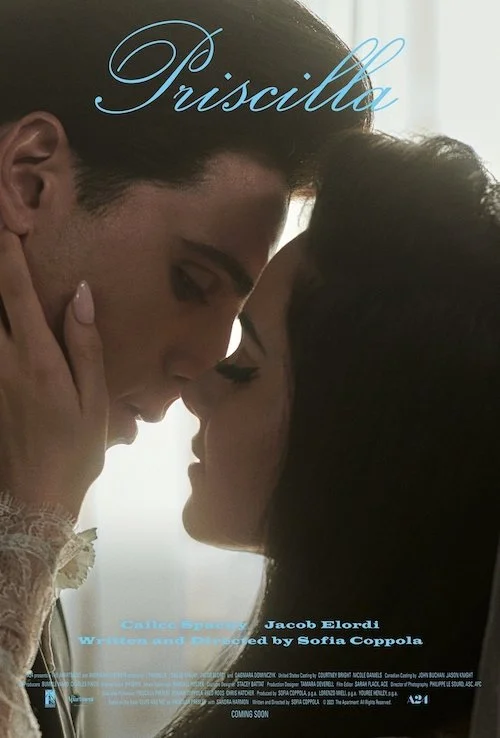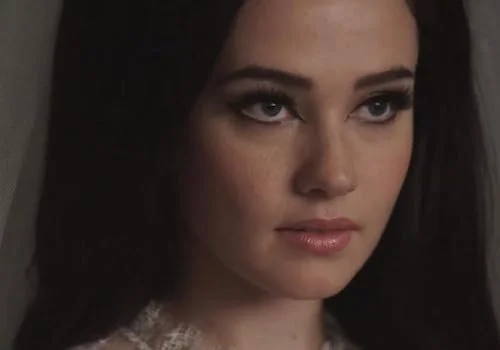Priscilla
Written by Andreas Babiolakis
Sofia Coppola makes films for young girls with the hindsight of the wisdom of women. The starting points of her features usually kick off with naivety, be it a newly married wife who imagines that the world is now hers and her husband’s oyster before he neglects her, a daughter trying to reconnect with her self-loathing father, or a take on Thomas P. Cullinan’s The Beguiled through the lens of females that try to nurture a wounded soldier before he threatens them with toxic masculinity and dominance. This year we have Priscilla: the analysis of Elvis Presley’s rise-and-fall through the eyes of his young partner and eventual wife Priscilla Beaulieu. In this film, Priscilla plays the part of a young teen who fantasizes about her celebrity idol, is given the opportunity to meet said superstar, and the dream of paradise both arrives and is dismantled before her very eyes. Coppola uses the memoir Elvis and Me (by Priscilla Presley) as a cautionary tale to all viewers of the dangers of grooming, no matter who the perpetrator is. In ways, it is careful as to not be a triggering experience for those who have survived or are going through similar circumstances, but Coppola also doesn’t hold back in Priscilla: one of her more tense feature films to date.
Priscilla still features Coppola’s knack for creating pictures that feel like daydreams, and the dreamer at the forefront is newcomer Cailee Spaeny (who, I think, should have been the person hired for that upcoming Audrey Hepburn biopic, because Spaeny is a dead ringer and clearly a gifted actor to boot). Spaeny is a terrific Priscilla from age fourteen to twenty-something. You feel her growth as a person, as an independent spirit, and as a girl and woman who is gaslit and exploited by a woman whom she is pining for. The film makes no mistake as to what it wants to get across by jumping right into a shot of teenaged Priscilla sitting in a diner, and being confronted by an army messenger on behalf of Elvis Presley who invites her to his domicile. From there on it is a whirlwind of blessings and curses in a toxic relationship. While I appreciate Coppola not turning Priscilla into her first melodrama, I wish the film had a bit more oomph to really drive home some of the weightier aspects of the film especially when it comes to Elvis’ addiction and behaviour; we easily get swept up in the high life of it all, but I also wish the film felt more like warning signs and red flags when it came to the worst side of this relationship. I don’t care for gossip or controversy, but I do care about a film’s tone and the conveyance of themes and emotions.
Cailee Spaeny is phenomenal as Priscilla Presley.
At the same time, while we don’t feel the straw that breaks the proverbial camel’s back, we do get sucked up in a cycle of empty promises, selfish acts, and ennui while Elvis is not at Graceland. We feel Priscilla is having fun on Elvis’ property at first until years of neglect turn a paradise into an empty prison; I adore how Coppola shoots automobiles and furniture in such a way that Graceland resembles a dollhouse and Priscilla its Barbie (in this case, Elvis is just Ken). Without overdoing visual aesthetics to convey moods, we somehow get tired of what Priscilla sees in the same way she no longer has that twinkle in her eye about this whole scenario. Coppola nails that boredom and the sense of losing the honeymoon phase without ever forcing these sensations on us. Additionally, Spaeny dominates every scene as Priscilla, either as a wide-eyed lover or as a woman who is fed up with chasing a dream that will never unfold. Jacob Elordi is also great as Elvis and was appropriately cast after being a despicable, problematic loser in Euphoria. Here, he towers over Spaeny and has a softer approach to his hostility, allowing you to see why second, third, tenth, and twentieth chances are given. My only complaint about the Elvis portrayal — like in Bohemian Rhapsody — is that you have strong actors take on iconic figures; why not complete the illusion with some contact lenses to give these performers the proper eye colours?
Nonetheless, Priscilla shines as a meditative take on spousal brainwashing, the chasing of idols, and the skewed perceptions of housewife roles via a director who knows when to say “when”. It is released at an appropriate time when we are all questioning our favourite celebrities and their ethics, are exposed to how some stars groom their fans for their own selfish reasons, and after the triumph of that other Elvis film (which pales in comparison, regardless of its loud volume and eccentricities). It leaves us wondering about the spectacle of pop culture and the worship of superstars, all while Coppola dials back her feature film. She never gets wrapped up in what she warns us of. It’s the kind of restraint I wish more directors had. Priscilla is the kind of film that works well upon its release, and while I still feel this is a four out of five because it is missing just one important element to truly elevate its dark side, I do feel this may be a feature that only grows better with time and with repeat viewings (like other Coppola films do). I respect Sofia Coppola for her ability to still never get wrapped up in the theatrics of Hollywood no matter what she does; with the biographical genre, she soars once again.
Andreas Babiolakis has a Masters degree in Film and Photography Preservation and Collections Management from Toronto Metropolitan University, as well as a Bachelors degree in Cinema Studies from York University. His favourite times of year are the Criterion Collection flash sales and the annual Toronto International Film Festival.






